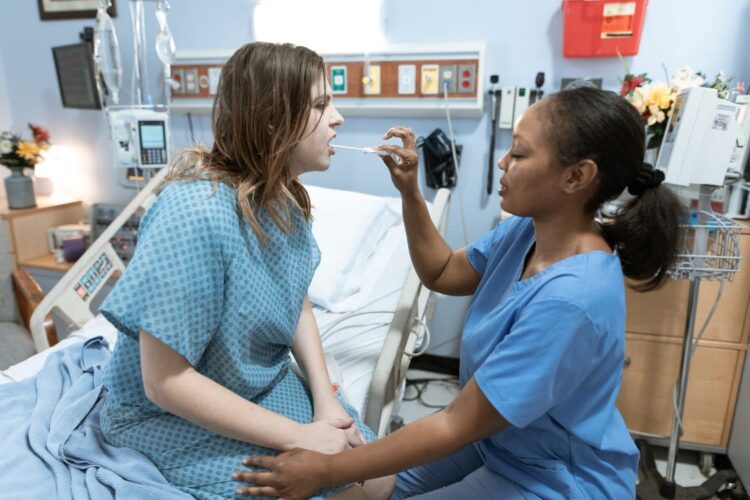Health
How Nurses Help in Health Promotion and Disease Prevention

The roles and duties of nurses are expanding as the expectations to receive improved healthcare services increase. From clinical practices and follow-up treatments to consultation, education, and disease prevention – it all falls upon the shoulders of the nurses. As prestigious as it is, the profession comes with a heavy responsibility to help improve the availability and quality of caregiving. Nurses are working every day to enhance their skills and work towards the betterment of the healthcare system.
The two major concepts that require nurses’ assistance are health promotion and disease prevention in a community. Health promotion is a notion derived to improve the living standard of society through the implementation of specific policies. However, nurses have made it a part of their everyday practices to use effective health promotion strategies by using behavior-changing perspectives. For disease prevention, they go for an individualistic approach to instruct their clients about the ongoing diseases, contagious and non-contagious, and how to avoid them. They review their medical history thoroughly and then construct strategies for a healthier lifestyle and propose them to their patients.
Many nurses are advancing in their educational expertise to get acquainted with the new requirements of the medical field. There has been an increase in the number of medical students applying for online degrees. Online education allows them to continue their education along with their current job. Aspirants can opt for online nursing degrees to upgrade themselves according to the latest standards. These programs allow them the flexibility to learn and work simultaneously. And thus, they get to enhance their clinical as well as academic experience.
Table of Contents
Types of Preventive Care
Research has categorized preventive care into three parts, each varying in responsibilities which nurses can take depending upon their expertise and position. Let’s have a look at them:
1. Primary
The first and primary type of preventive care consists of measures and policies focused on educating individuals regarding an ongoing condition, such as the current pandemic. Nurses play an essential role as teachers to offer knowledge and counseling to the public while encouraging them to accept more positive and healthy choices. They provide immunization to the patients and focus on holistic healing.
2. Secondary
Secondary prevention includes a measure to detect and identify early symptoms of diseases through regular screening. Nurses, then, take over to help patients control the risk and bring changes to the patient’s lifestyle, motivating them to live healthier lives. It prevents the development of the identified ailment and counts as a secure technique of preventive care.
3. Tertiary
Tertiary prevention involves the complete treatment of an existing disease through medication or operation. Nurses play their part by assisting patients in developing a plan which helps them improve their medical condition. It only comes to tertiary prevention when the previous two have failed, and it is useful in averting imminent challenges.
How Nurses Help
Nurses play a vital part in professionally working frontline to promote health and preventive care. They majorly do it by keeping the patients informed about new diseases and how to protect themselves. While previously, nurses’ practices revolved around disease management, but now their needs and demands are increasing. Here’s some way in which the healthcare industry, today, expects nurses to help in health promotion and disease prevention:
1. Identifying Patients at Risk
The primary part that nurses play in health promotion identifies the most at risk by paying close attention to their demographical and environmental data. If a patient lives in a densely populated area, there are more chances of them being at risk of catching a disease. Also, suppose the patients belong to the older aged population. In that case, nurses treat them accordingly by guiding them to avoid chronic ailments. Secondly, nurses pay heed to regularly screening their clients and facilitating them with valid information, which helps them access quality healthcare. They do so by closely monitoring their previous history and their family’s to identify possible conditions they might acquire.
2. Educating Staff, Clients, and Community
Nurses have been working as educators for patients and the community for a long-time. Now they’ve taken up the responsibility to become health promoters, too. They have become the building blocks of the healthcare system and society. They are teaching their patients about caring for a surgical wound to helping them understand the importance of self-care when dealing with chronic illnesses. They also teach the community and common people about preventive care, especially when there are uncertain and contagious viruses widespread in the environment. Lastly, nurses and nurse leaders have to educate their peers and staff regarding safety precautions. They learn and teach other innovative ways to promote health and improve the quality of caregiving.
3. Using Holistic Methods
Now that hospitals are focusing on giving patient-centered care, nurses have taken up the responsibility to cater to the individualistic needs of the patient. They are using holistic methods, treating patients’ mental as well as physical sicknesses. It helps them promote health by ensuring that their patients understand the need to always look out for stressful situations that can cause them to become physically sick. It is one way to prevent chronic diseases like diabetes and high blood pressure. Also, holistic healing means that the patients are now more aware of their own medical needs and cater to them.
4. Providing Access to Care
A vast majority of the human population is not aware of the medical services available to them. Hence, they don’t make the best use of them. They are uncertain about the care they can acquire under their health plans. And as a result, they miss out on essential services which can help them be more preventive such as blood test, vaccinations and screening for cancer or tumor regularly. Nurses help them stay connected with these plans and explain to them how accessing healthcare is their right.
Conclusion
Conclusively, being a nurse is a time-consuming job. Still, empathy helps them excel in the field while being effectively valuable for the community. Nurses play an essential role in any healthcare facility. How nursing staff help to promote health and educate patients about preventive measures is commendable.

-

 Business3 years ago
Business3 years agoThe Ultimate Guide To Thriving In Your Printing Franchise
-

 Business3 years ago
Business3 years agoExploring The Benefits And Challenges Of Restaurant Franchising
-

 Business4 years ago
Business4 years agoHow to Do Long-Distance Moves with Children
-

 Tech4 years ago
Tech4 years agoCyber Table That Will Change Your Life
-

 Lifestyle3 years ago
Lifestyle3 years agoDallas’ Hidden Gems: 6 Must-Try Restaurants Off The Beaten Path!
-

 Lifestyle3 years ago
Lifestyle3 years agoTop 10 Restaurant Franchises In The US
-

 Business5 years ago
Business5 years agoIs Guest Posting a Good Inbound Marketing Strategy?
-

 Business3 years ago
Business3 years agoTop 10 Reasons You Should Invest In A Coworking Franchise













Recent Comments